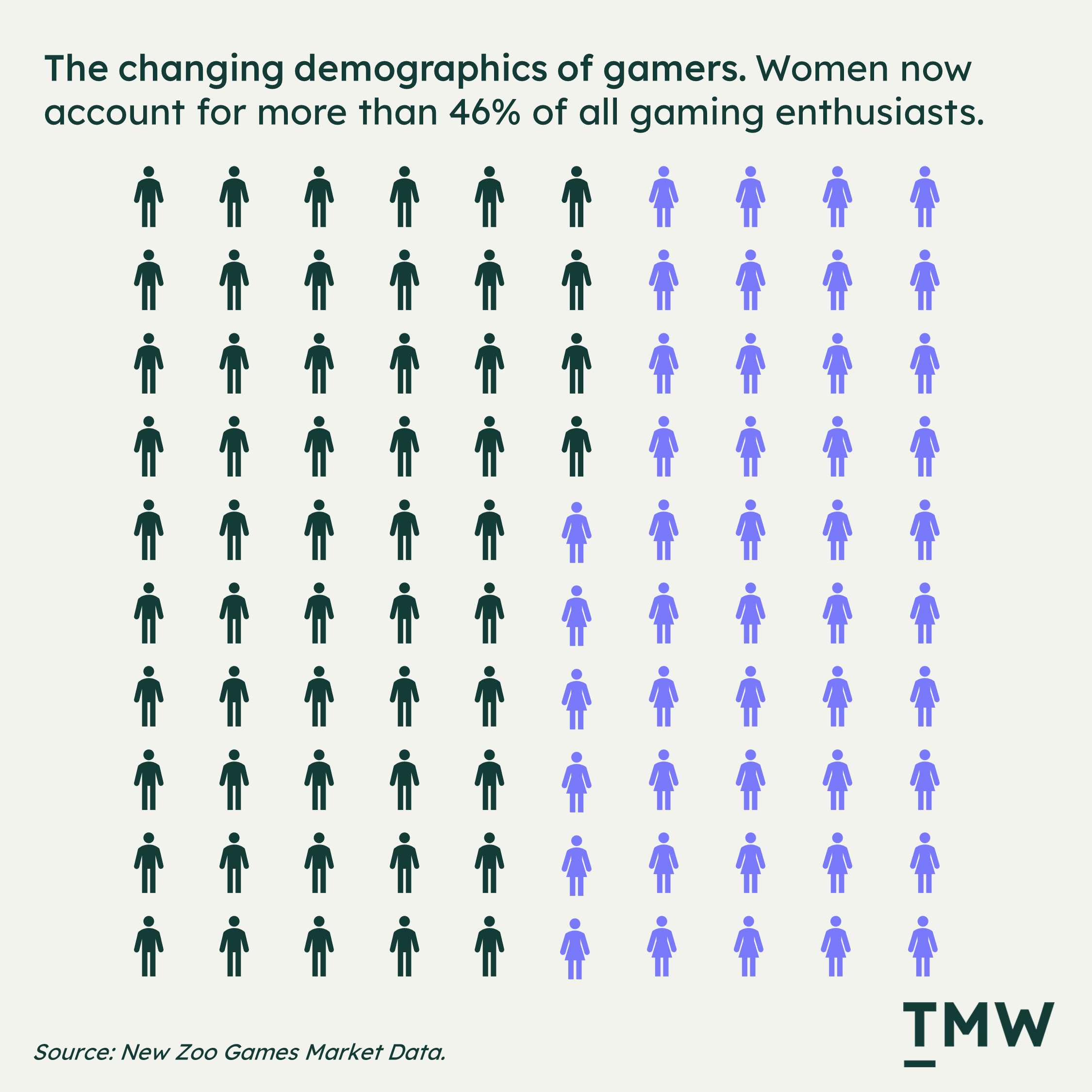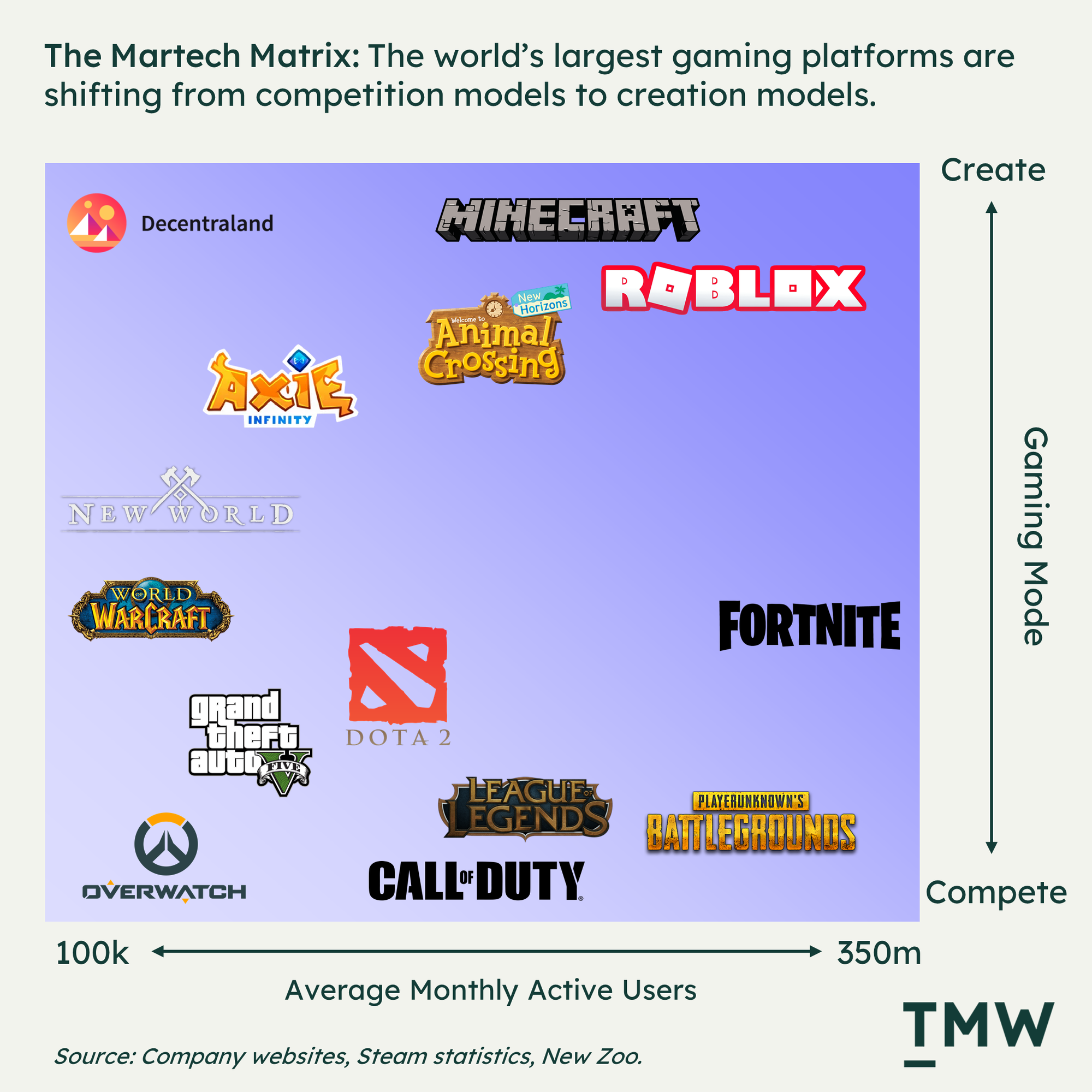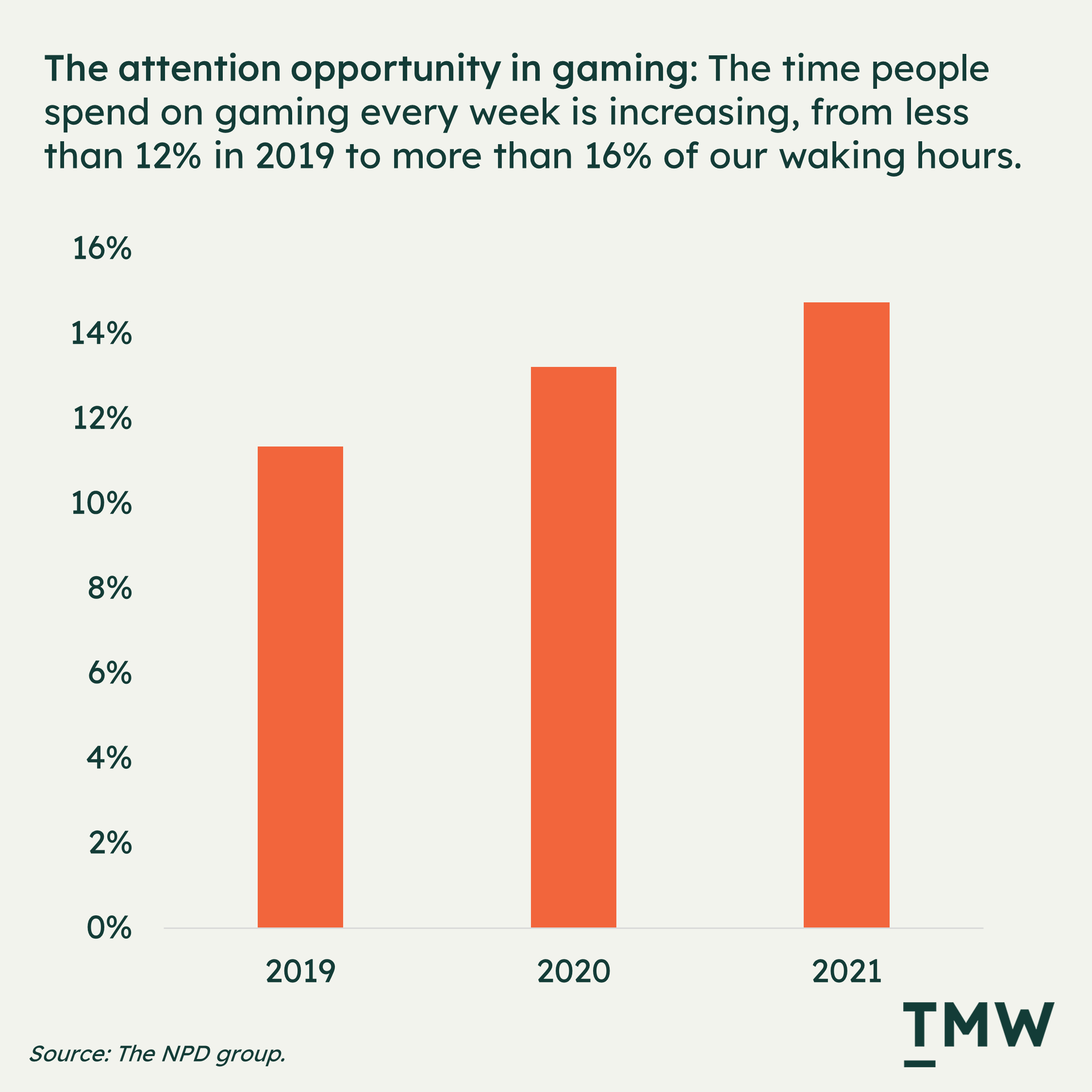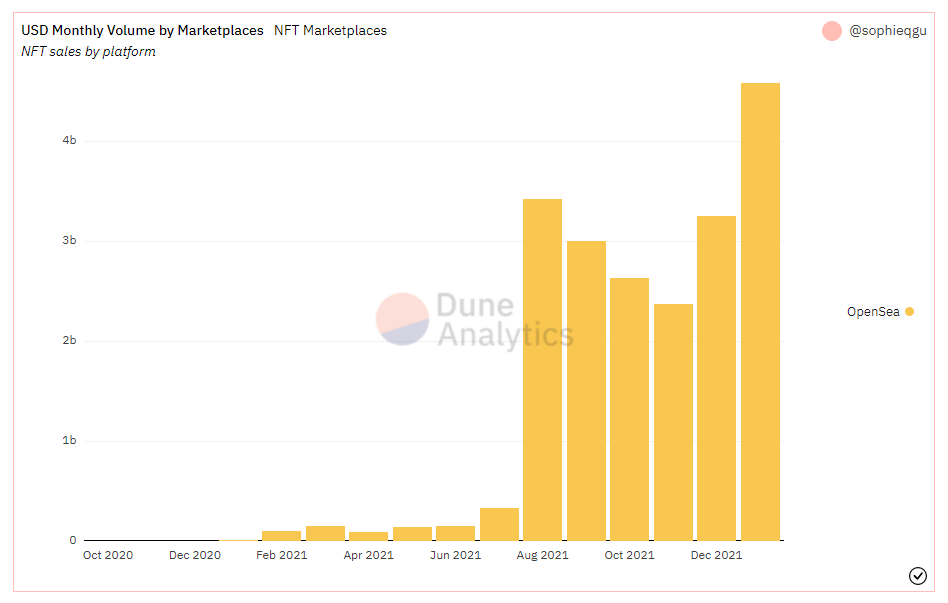TMW #070 | Martech and gaming, illegal analytics and the NFT monopoly.
Welcome to The Martech Weekly, where every week I review some of the most interesting ideas, research, and latest news. I look to where the industry is going and what you should be paying attention to.
👋 Get TMW every Sunday
TMW is the fastest and easiest way to stay ahead of the Martech industry. Sign up to get the full version delivered every Sunday for this and every TMW, along with an invite to the TMW community. Learn more here.
Here’s the week in Martech:
● Should gaming be part of the Martech landscape?
● The NFT monopoly
● Google Analytics deemed illegal
● Plus: Shopify’s partnership with China, banning targeted advertising, the data lakehouse, and personalisation, the big app report, the failure of the 360-customer view, Salestech replacing salespeople, and why is LinkedIn so cringe?
✍ Commentary
How will gaming fit into Martech? History’s largest acquisition of a gaming studio – Activision Blizzard happened this week. Purchased by Microsoft at $70 billion, the acquisition was complimented by a decent amount of commentary about Microsoft’s strategy to build or participate in, (depending on how you see it), the emerging concept of the metaverse. In the investor briefing, the term "metaverse" was mentioned no less than 10 times. This acquisition comes as the largest single investment in the history of Microsoft and the gaming industry, 3 times larger than LinkedIn, 8 times larger than Skype, and 137 times larger than Hotmail.
The increasing valuations of gaming platforms follow a generation shift to more hours spent and more bums on seats playing video games. As the industry expands and diversifies, it is also becoming a central part of how people spend time and spend money. So, it begs the question – why is the gaming industry overall ignored by marketers everywhere? And is that going to change?
There are only three (and maybe four) reasons why the gaming industry exists. These are boredom, escapism, and socializing, and the fourth and emerging reason is to make a living by playing to earn. This should make it a paradise for marketers to create value for their brands, as gaming is becoming less of a thing for players, and more of a thing a participant does to socialize, burn time, blow off some steam and make some money on the side. It’s only until recently that marketers have started paying attention and here's why.
The concept of the Metaverse gives marketers the ability to justify investing in the gaming industry. If you think about it, gaming used to be segmented into the teenager, early 20 something demographics that skewed overwhelmingly male. Now that picture is changing. Gamers are older and more represented by women. But the stereotypes of the typical gamer prevails, influencing the kinds of opportunities marketers see in the industry. If you reframe the gaming industry as being on the frontiers of the metaverse, then it shifts a narrative away from the old ways of thinking about it to something new, and exciting.

The first shift in thinking is that the metaverse will become less about certain demographics and more about opening up participation for everyone. The metaverse then becomes a way to augment how the internet works today. This is kind of like Neopets but in 3D and with an API. Neopets was so popular back in its prime that young people from all walks of life were able to engage with it (and still do to this day). Gaming engines are positioned as the underlying technology that will enable the metaverse to exist, instead of the destination for people to play. The change in language is important in this regard.
Another change in thinking is that metaverse will be social first and foremost. We neglect to appreciate how gaming has evolved the concept of social media. All major gaming platforms have a social layer to them and have been building these layers for more than a decade. Up until recently most of the social activity was focused on augmenting existing gaming patterns to involve team participation or competition.
One of the earliest iterations of social first gaming platforms was World of Warcraft, but newer games are built as completely different social constructs, with an endless amount of ways in which people participate. Roblox is about building new worlds for other people, Minecraft, which just hit a trillion YouTube video streams, is about creating things to share across social platforms. Fortnite is less about creating and more about competing but was one of the first to introduce the concept of purchasable character designs and weapons, and Axie Infinity is kind of like building a crypto economy in a Pokémonesque universe (an opportunity Nintendo is probably looking at). These trends suggest that the evolution of gaming in the metaverse will shift from multiplayer to multicreator. It will be about building worlds.

Alongside this, there is speculation from Ben Thompson from Stratechery that the metaverse will become the next operating system, kind of like when Microsoft introduced Windows to the market. The idea is that by targeting remote-first enterprise businesses with products like Facebook’s Horizon Workrooms, this will then influence consumer patterns of behaviors in the same way that the PC was enterprise first and then a consumer product. It’s obvious here that the use case for VR headsets will make more sense because the metaverse will function something like a new type of internet OS with needs for a new type of hardware.
The way VR overlaps with the concept of the metaverse seems to make a lot of sense. As you interact with others in a digital environment, it will be less about starting into a Zoom window and more about stepping through the window into a 3D world filled with all the things people want when interacting with each other; serendipity, being present and the ability express yourself in better ways. As most of the attention in VR to date has been in the gaming world, it’s here that experiences are built on top of VR technology and user behaviors are measured and analyzed. The form factor of VR, like the iPhone, and PC before it is driving behavioral change in how people interact with technology.
All three ways to think about the metaverse center around changing the narrative on gaming platforms. From player to the participant, from gamers to everyone, and from a niche to a technological substrate for living your best digital life. The question then arises, who is going to pay for all of this? Will you?
If the internetification of content is anything to go by, then the answer is no. Online content creation originally fell under the spell of “everything needs to be free”, and so when this happened the question of who will pay the newsrooms and content creators needed an answer. The shortest path was programmatic advertising, which then allowed media organizations to scale through ad networks created by Google and later Facebook and a constellation of DSP and trade desk companies. A reality of the internet is that it became a mass consumer platform because of advertising technology, so as gaming facilitates a hypothetical shift to the next way of interacting online, why would we expect that this would also not be powered by ads?
The best customer experience is when someone gets something for free. I would expect that the majority of whatever the metaverse will become won’t be paid for by the average person, but the brands that are wanting to leverage the kinds of attention and behaviors that games have created. What other kinds of media can get people to play for hours on end and increasingly so? What other kinds of media generate communities of millions of passionate fans, where people are finding friends, lovers, and collaborators? That’s right – it’s gaming!

It’s no surprise then, that Meta has already patented two advertising concepts for VR experiences; programmatic advertising in digital 3D space and the ability for brands to build locations and objects in the public domain. Consumer attention mediated through smartphones and computer monitors is extremely fragmented, which influenced the kinds of content that is created for advertising. If the future will be mediated through VR, which facilitates a less fragmented and more immersive experience, then attention will become more valuable as a marketing commodity, and the applications of advertising will need to get this right. I expect that the advertising industry will go through another evolution of creative expression in these spaces, in ways we’ve not even begun to start exploring.
While I think that advertising will be a core pillar of taking the metaverse to the mainstream, there are other customer experience questions we need to answer. What if brands start offering a digital store in 3D worlds, like the slightly off-putting Walmart metaverse concept? You’ve probably already seen some AR ideas floating about in fashion, like visualizing a pair of sneakers on your feet. But in shared, public, and social 3D space, where you can walk down a digital Fifth Avenue in New York, there will be whole new ways for brands to compete on experience.
Digital worlds don’t need to play by the rules of the physical, which opens up a whole new talent stream to imagine what brand experiences could look like. An interesting thought experiment would be how would you design a 3D digital store if gravity did not exist? Would you do rows and aisles? Would you need to buy through checkout? Surely someone out here is thinking about this.
The internet forced brands to create experiences that fit into the shapes of the browser viewport. A website in the form of a small rectangle is what marketers have had to work with in the past. In the 3D realm, the best brands in the world will be competing for both real estate and skilled people to create without the constraints of the small rectangle, which is both exciting and terrifying at the same time. Like everything else online, there will always be good and bad actors, and if the metaverse is an experience enhancement shift, then the good is likely to get better and the bad will get worse
So, should the world of gaming be incorporated into the Martech ecosystem? All evidence points to a yes, especially if you understand Martech to be about how marketers harness technology to advance their brand’s goals. Right now, there’s a lot of hype and future-focused thinking, but if the underlying concept of moving the internet from 2D to 3D holds up, then expect an explosion of advertising solutions to power the movement and brands wanting to differentiate themselves through experience. But when the shift starts to happen, how marketers will get to the metaverse? It will be through gaming. Links: Microsoft acquisition of Activision Blizzard. Forecasting the metaverse. Time and money spent on gaming. Gaming demographics. Agencies navigating the metaverse. The emergence of “play to earn” Meta’s advertising patents. Walmart metaverse concept. Minecraft's trillionth stream.
📈Chart Of The Week
The NFT monopoly. OpenSea, the NFT marketplace currently controls 97% of the market, in January this year the platform has facilitated more than $4 billion USD in NFT sales. By the way, OpenSea controls a higher share of market than Google and Facebook in their respective fields. I thought Web3 was supposed to be decentralized? Links: Analysis, Data.

📰 Latest Developments
Google analytics deemed illegal? The Austrian government has deemed the use of the world’s most popular analytics suit illegal because the platform hosts user identifiers in places outside of the EU. The case is isolated to one website, but the terms of the infringement could more or less be applied to any website operating in the EU. The core of GDPR regulation is about where the data is stored and processed, not collected which opens up quite the can of worms for almost any service you use to manage customer data online. Link
Shopify, now available in China. JD.com, a massive Chinese e-commerce marketplace has struck a deal to partner with Shopify to enable merchants to list their products in the JD ecosystem. This brings about half a billion Chinese customers into reach for merchants abroad and simplifies the compliance needs for the region. Link
Banning surveillance advertising. Democrats in the US have introduced a bill that prohibits advertisers to target ads to users. Contextual and geotargeting are excluded from the criteria. If successful, you might see a lot of Adtech company execs looking for new jobs, as well as fundamental changes to the business models of Facebook and Google. I don’t think the bill will be successful in its current form, however, the industry collapsing nature of something like this is only the beginning of regulating online tracking. Expect more. Link
📚 Reading
The data lakehouse for personalization. An interesting case study into how HBO Max uses the technology to facilitate analytics and content decisioning for 70 million customers. The goal is to create something that replicates the experience of a friend recommending a movie. Link
Facebook Marketplace. I had no idea before reading this that Facebook Marketplace (one feature in the blue app) has the 2nd highest monthly active users in the world behind Amazon. A fascinating story on how the product came to market, the PM behind it, and how it more or less destroyed every other second-hand marketplace online. Link
Wordle. In a matter of weeks, this very simple game went from fewer than 1,000 to 2 million players. Here’s an interview with the founder talking about the nature of virality, rejecting VCs, and choosing against monetization. Link
🔢 Data & Insights
The big app report. According to App Annie, in 2021 consumers spent 3.8 trillion hours on mobile apps, or about 4.8 hours per day on average 🤯. Maybe you should launch that app idea. Link
Luma annual Adtech report. 18 companies in the sector went public last year, with an +82% increase in deals, and more activity in late-stage VC funding. Link
Has the 360 view failed? Gartner is reporting that only 14% of organizations have successfully implemented what they call a 360-Degree view of the customer. Too hard or not enough value? It’s probably both. Link
💡 Ideas
The ethics of fake influencers. Meta is creating a framework for the ethical use and behaviors of digital influencers. The whole concept of a non-real person creating online influence is already an ethical quandary. Link
Is Salestech replacing salespeople? This week Pfizer reported a strong year of sales, hitting $80 billion, but the company is also downsizing its sales team. The pandemic has increased sales efficiency remotely so much that they just don’t need as many people. Links: Pfizer, Salestech landscape.
Big Green DAO. The world’s first crypto-powered philanthropic decentralized, autonomous organization. Link
✨ Weird and Wonderful
Vendor zombies. Link
Why is LinkedIn so cringe? Link
The shoe that can charge your phone. Link
Stay Curious,
Make sense of marketing technology.
Sign up now to get TMW delivered to your inbox every Sunday evening plus an invite to the slack community.
Want to share something interesting or be featured in The Martech Weekly? Drop me a line at juan@themartechweekly.com.
